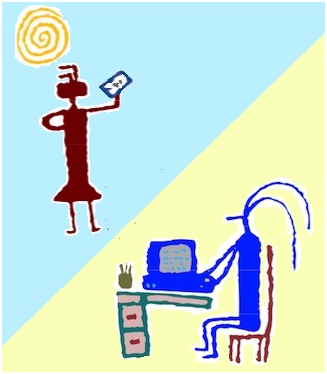Did you discover last month that your nonprofit, NGO, government program or other cause-based, mission-based initiative is overly reliant on Facebook?
Sara Soueidan is a front-end user interface (UI) and design systems engineer / speaker / trainer and she tweets about usability and accessibility. On October 4th, when Facebook went down for several hours, she tweeted this:

While we’re at it: if you don’t have a Web site of your own and you’ve been blogging and creating content on third-party platforms, now might be a good time to reconsider creating one and owning your own little corner of the internet.
I completely agree. I am horrified at how many nonprofits, NGOs, government programs and other cause-based organizations have pretty much abandoned their own web sites and post only to Facebook.
- Facebook is a for-profit company. If Facebook goes away tomorrow, there goes all of your data. By contrast, the address of your web site is yours, and if your web host were to go away, no problem – you move your site to a new host. Your address doesn’t have to ever change. You can move your web site to a different host is you decide you don’t like the host’s customer service or prices, or if the host goes out of business.
- Facebook terms of service strongly imply that whatever you post there, Facebook owns, and that Facebook has the right to sell or give what you post to Facebook, even in your account profile, that you have marked as “private”, to anyone it wants to. By contrast, a web site is yours. The content and the address are yours.
- Facebook content is only for Facebook users. If someone doesn’t have a Facebook account, they cannot see most of what is on Facebook. By contrast, a web site is public and anyone with Internet access can see it.
Your web site is your primary home on the Internet. Everything you do online, including on social media, should ultimately link back to your web site. Yes, you can use the Facebook events feature to announce events, but that event information should be on your web site as well. And remember that many of your clients, volunteers, donors and others use different social media channels. Have you asked them not only if they are on Facebook, Twitter, Instagram, or whatever the flavor of the month is, but also if they would want to interact with your program on these.
Your blog should be on your own web site as well. I use WordPress, which is free, but I use my own web site to host it. Twice, my blog host has gone under, and in both cases, neither was captured on archive.org. Luckily, one did give me enough of notice for me to download all of my blogs, so I could repurpose many of them here.
I even screen capture Twitter or Facebook interactions that are particularly memorable or worth bragging about, and upload them to Flicker and maintain a database of such, and all of my photos, on a hard drive.
Yes, there are people who are going to interact online with your initiative only via Facebook. Or Twitter. Or even only via email. None of those audiences are more important than another for your nonprofit, NGO, etc. Make sure all of your clients, volunteers, donors and others are reminded regularly of all of your various online communications channels – and your web address!
Also see:
- Ethical question for nonprofits: should you delete your Facebook account? – from 2019.
- Don’t over-invest in one social media channel (particularly Facebook) – from 2021.
- Why Your Organization Probably Doesn’t Need A Facebook Page – updated 2017.
- Did Facebook hurt the Syrian Revolution? – from 2016.
- A warning re: Facebook privacy from Nicholas Thompson – from 2014.
- Daily, Mandatory, Minimal Tasks for Nonprofits on Facebook & Twitter.
- Too much text on the web? Bollocks
- Taking control of your web site when you aren’t the web master
- Are Accessible Web Sites Only For Companies That Can Afford Professional Web Designers?
- 14 simple things to do to your web site to attract more donors
- What should be on a political web site
- When to Monetize a Web Page
- If I can’t find what I’m looking for on your web site, who else can’t?
- Is your web site for everyone, or just the elite?

If you have benefited from this blog, my other blogs, or other parts of my web site and would like to support the time that went into researching information, developing material, preparing articles, updating pages, etc. (I receive no funding for this work), here is how you can help.

